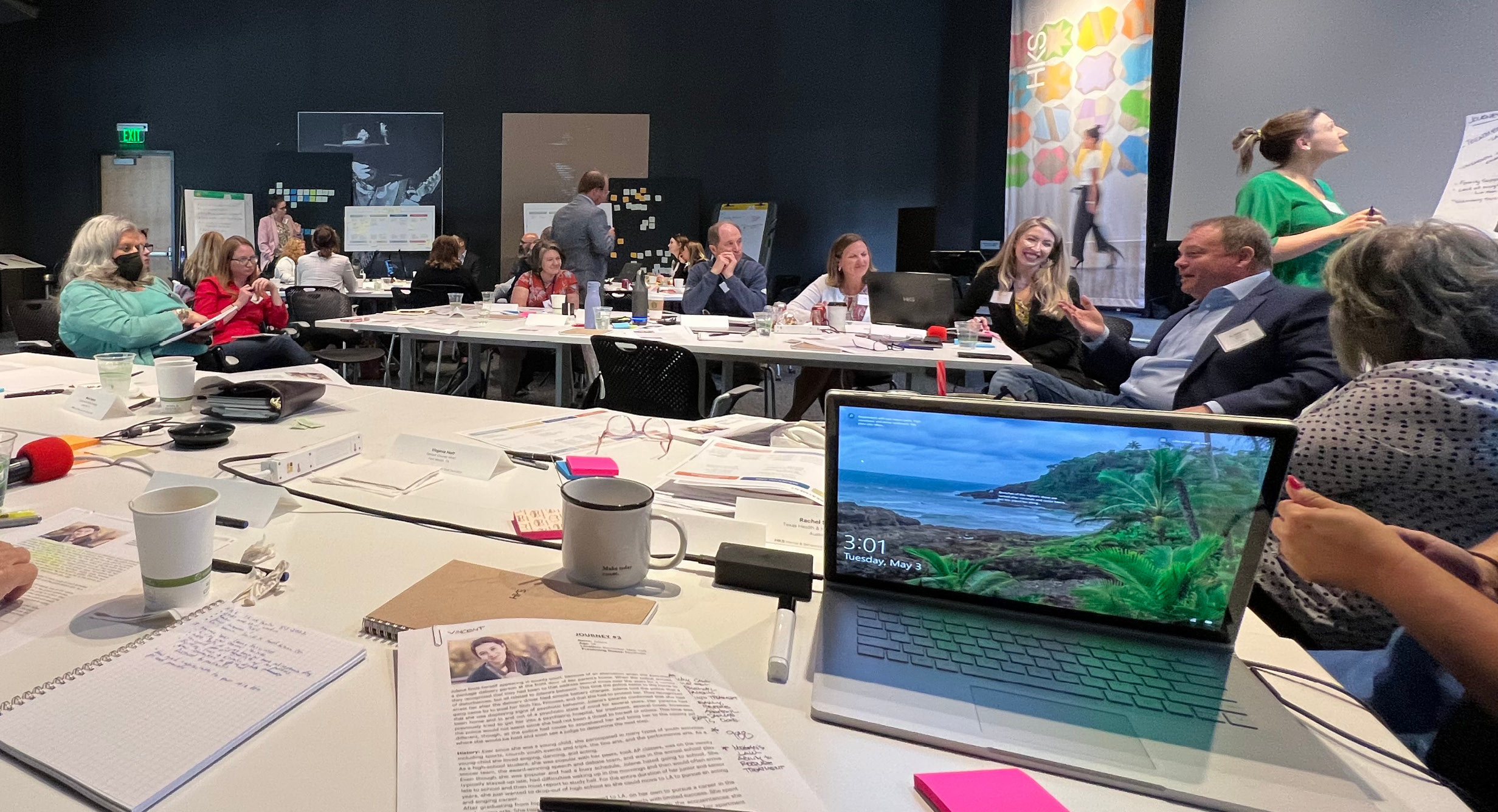
HKS Think Tank Tackles Mental Health Care Obstacles
The rate of depression in the U.S. more than tripled between 2019 and 2022, exacerbated by a global pandemic that shook up daily routines and kept millions of people at home for excruciatingly long periods of time.
The crisis affected young people deeply – 37% of American high school students reported in 2021 that they were experiencing poor mental health, and 44% said they had persistent feelings of sadness or hopelessness.
But the stigma around mental illness continues. National data suggests that fewer than half of Americans facing mental health challenges receive the care they need. That percentage is even lower among people of color and individuals who are unsheltered.
In early May, the HKS Health practice gathered 21 experts from education, health care, nonprofit homeless coalitions, and the judicial system to discuss barriers to mental health care and brainstorm ways to make it more accessible across age groups. Participants represented rural towns like Forney, Texas and larger cities like Nashville, Tennessee, and Overland Park, Kansas to explain opportunities and challenges within their markets.
National data suggests that fewer than half of Americans facing mental health challenges receive the care they need.
The inaugural Think Tank coincided with the start of Mental Health Awareness Month in the U.S. and although it was hosted at the HKS Dallas office, the two-day event did not touch on design at all. Organizers said that was intentional.
“In a [design] project, you’re limited to certain discussions because you only have so much time with the clinical teams,” said HKS Project Manager Nathan Howell. “We wanted to have this time to get all of these diverse people together to really talk about things on a bigger scale. How can the industry improve? How can we better communicate across those boundaries and silos that are normally there?”
Barriers to Receiving Care
In a virtual keynote address to frame the event, Canadian social worker Lauren Kennedy West shared how her own diagnosis of schizoaffective disorder shaped her life and the obstacles that she faced when seeking care.
“When I was first diagnosed, one of the places I turned to first was of course the internet and YouTube, but I was left feeling rather alone as I didn’t find many others sharing their experiences or patient-centered knowledge about what it means to live with the illness,” Kennedy West said.
She eventually created the YouTube channel Living Well with Schizophrenia to make the resources she has uncovered on her journey with mental illness more accessible to others. Reflecting on her experience, she wishes more education was available to her so she could identify her early symptoms and find appropriate interventions sooner.

Using Kennedy West’s story to build from a place of empathy, the HKS Mental and Behavioral Health Think Tank participants dove into four realistic patient stories to identify factors that may have kept them from receiving care. During the discussions, many of the attendees shared anecdotes from their own lives — an uncle struggling with alcohol addiction, a family member living with psychosis, a child experiencing depression, an elderly grandmother — to highlight why it is critical for mental and behavioral well-being to be at the forefront of care in the U.S.
After reading the story of a young, unsheltered man struggling with substance abuse, the Think Tank participants said early awareness and early intervention could have altered his path and improved his quality of life. They said his school, parents, primary care physician, peers, friends, programs offering resources for homeless individuals, and detox programs could have helped him at any given point if they had more awareness of substance intervention and felt the autonomy to intervene.
Think Tank participants shared that for individuals experiencing homelessness, the solutions must be rooted in the basics. They need a place to stay and a phone where they can be reached, so their mental health professionals can keep in touch and provide consistent support.
For those who decide that they’re ready to seek help, not knowing where to go for support can be a big hurdle. A lack of clarity on the many avenues for help often turns to psychiatrists, who have become a catch-all solution for needs that can be addressed in other ways.

Many of the think tank participants emphasized that the elderly also need more attention because of the effects of acute health issues on their mental well-being.
An estimated 10,000 Americans turn 65 every day, and will continue to do so until 2030, according to Georgetown University. America’s growing retiree population and increasing average lifespan are likely to put a strain on the country’s health care system.
“I don’t think we think of mental health interventions in our aging populations as we do for others,” said Virginia Hoft, Executive Director of the Tarrant County Mental Health Connection.
Changing the Norm
The second day of the Mental and Behavioral Health Think Tank focused on ways to optimize public health by eliminating roadblocks that individuals may face when seeking mental health care.
Attendees who work in schools said educators can play a big role as early intervenors because children spend most of their waking hours at school, and because waiting too long to get support can snowball into a bigger, costlier mental health crisis.
“Intervene early, so you can intervene less,” said Dr. Sarah Wakefield, who chairs the Texas Tech School of Medicine’s Psychiatry Department.
The group agreed that people-centered care focusing on the personalized goals and desires of the patient, instead of relying on systems to apply a generalized treatment plan, could be a powerful first step in promoting overall well-being and autonomy.
“Mental health care is just care. It’s seeing people as a human and not a problem,” Wakefield said.
Kathryn Everest, the Director of Counseling Services at Fort Worth Independent School District, said educating families about well-being could begin as early as pregnancy. That family education can continue into schooling with resource fairs where educators can learn about local support services for youth and connect parents to the right type of help for their child.
Mental health care is just care. It’s seeing people as a human and not a problem.
She added that preparing youth for the challenges they will likely face in life – and normalizing the fact that struggle is part of life – may enable them to be more resilient adults.
“We need to help parents understand it’s OK to ask for help and that it’s OK that your child struggles because most children struggle at some point,” said Everest, who has 28 years of experience in school counseling.
For adults, health professionals are leaning on technology and community partnerships for new interventions that can help them identify stressors as early as possible.
Dr. Laura Spence, an Associate Dean at the University of North Texas Health Science Center in Fort Worth, shared that the center uses an online wellness assessment that asks patients questions about their background, assessing their stress, sleep, and nutrition among other factors to gauge their overall well-being.
“When I think about technology and our capacity to screen and intervene and have an initial technology-based intervention prior to the human connection, this has worked better than I ever could imagine,” Spence said.
In Austin, a sobering center allows low-risk intoxicated individuals to spend a night in a comfortable space to get sober, instead of being taken to jail or a hospital. They also have the option to transfer into addiction treatment, if it is determined that they will need more long-term support. Offerings like this have helped reduce rates of incarceration and point to the heartbeat of care for our communities and the individuals that need our support.
Designing with Context
The HKS designers who organized the Think Tank said that while architecture was not the focus of the conversations, the key points that emerged from the event will undoubtedly inform HKS’ approach to design.
HKS Senior Medical Planner Rachael Farrell said that she enjoyed facilitating the conversation while giving the experts in the room a platform to share their insights.
“A large part of why we wanted to host this event was to actively listen and learn from the professionals that tangentially inform what our toolkit becomes downstream,” Farrell said. “Parity in federal law, care reimbursement structures, and medical education are not traditionally our space to professionally speak into, but if we want to truly understand the needs of the built environment we are obligated to challenge the bounds of our understanding and prioritize what is important to our clients, their patients, and the infrastructure that supports them.”
She added that she was most moved by the organic ideation that emerged from the Think Tank. For many of the participants, it was their first opportunity to collaborate with individuals from across so many industries that inform wellness.
“You could see an attendee’s face visually light up as they heard a professional across the table share a solution to a challenge or a barrier within their current state, and then watch another with a completely different lens and perspective add the next level of refinement,” Farrell said. “The cocreation was dynamic and really beautiful.
Howell, whose role at HKS includes managing health projects, said he was impressed by the conversation about the role that schools play in a child’s behavioral and physical development.
“It was really interesting to hear the discussions around the school system, in particular, and how integral that component really is to the care spectrum,” Howell said.
Farrell and Howell said the HKS Health Team intends to synthesize the findings from the Think Tank for the firm’s other practice areas to use. The current plan is to develop a whitepaper to share learnings beyond the firm and to host other conversations that delve into other critical health and wellness topics.
“We’re trying to make this as meaningful as possible,” Howell said. “We’re architects and try as we might and as much as we know, we’ve got our blind spots too. We’re hoping that collaborative events like this are meaningful for the whole industry and can start to move the needle toward positive change.”
We’re hoping that collaborative events like this are meaningful for the whole industry and can start to move the needle toward positive change.



